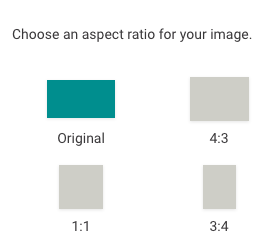If defined on an <img> tag, enables users to set the src attribute.
If defined on any other tag, enables users to set a background image CSS property to that tag.
Example
{
name: 'image',
label: 'Bild',
iconUrl: `https://livingdocs-assets.s3.amazonaws.com/magazine-design/assets/images/icons-components/icon_image.svg`,
directives: [
{
name: 'image',
type: 'image',
recommendedRatios: ['16:9', '1:1', '4:3', '3:4'],
srcSet: {
defaultWidth: 1024,
widths: [2048, 1024, 620],
sizes: ['100vw']
}
}
],
html: dedent`
<div class="m-asset-image m-asset-image--numbered">
<div class="m-asset-image__image">
<img doc-image="image">
</div>
<div class="m-asset-image__options">
<div class="a-asset-input" doc-editable="caption">Caption</div>
</div>
</div>
`
}
Config Options
Ratios
The image ratio definitions control how the crop tool in the Livingdocs editor is configured.

There are two ways to configure how the crop tool behaves. If you configure imageRatios, one of the given ratios is enforced.
If you configure recommendedRatios, the given ratios are presented to the user, but a custom aspect ratio is possible.
imageRatios: array of strings, an array of strings, e.g. ‘16:9’
recommendedRatios: array of strings, an array of strings, e.g. ‘16:9’
Named Crops
Alternatively to imageRatios/recommendedRatios you can configure namedCrops if you are using that system.
To understand what Named Crops are, read the Media Library Guide.
SrcSet
The srcSet defines the parameters for HTML srcsets. If set, Livingocs will generate a srcSet attribute on the HTML tag where the image directive is defined. There is a global (instance-wide) default for srcSet and image directives can overwrite this.
Schema:
srcSet: ms.obj({
defaultWidth: 'number',
widths: ms.arrayOf('number'),
sizes: ms.arrayOf('string')
})
For an example see at the top.
Background images
If the doc-image directive is used on any other tag than <img> it will automatically be set as a background image.
Background images don’t have srcSet properties (see above). Thus you can define a max width that should be used under the directive config key backgroundImage.
Example:
backgroundImage: {
maxWidth: 1024
}